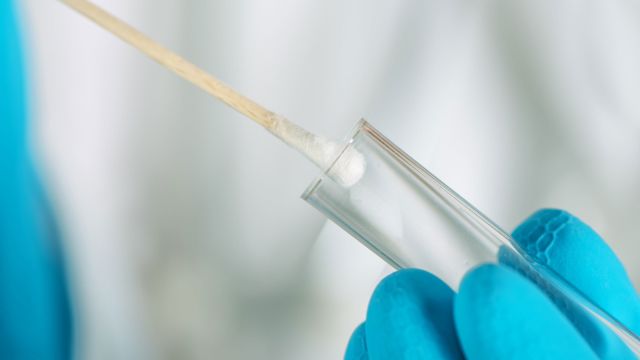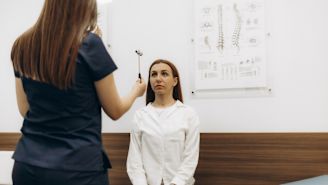Updated on March 5, 2025.
Have you been tempted to buy an at-home genetics test? If so, you’re not alone. Companies like Invitae market heavily to consumers with the promise that being aware of your genetic disease risk can help you take a proactive role in your health.
To be clear, these genetic health risk reports are not diagnostic. They don’t tell you whether you have a certain disease or health condition, and they shouldn’t be used alone to make decisions about your medical care. Instead, they tell you whether you carry specific genetic markers and might be at increased risk for some illnesses.
Before you spit into a test tube and mail your DNA sample to a lab, consider all the ramifications of taking an at-home genetics test.
Is the test reliable?
Perhaps not. “If you take [these at-home tests] they don’t give you consistent results,” explains Art Caplan, Ph.D., professor and founding head of the Division of Medical Ethics at NYU Langone Health. “Different labs have different interpretations of your DNA. So, the science may not be up to trustworthy levels yet,” Dr. Caplan adds.
Whatever at-home test you choose, your results report should provide details about the testing lab’s accreditation. The lab should adhere to federal regulatory standards, which help control the quality of the tests. These are called the Clinical Laboratory Improvement Amendments (CLIA). Many at-home genetic tests have not been CLIA-certified.
Many tests aren’t regulated by the U.S. Food & Drug Administration (FDA), either. The FDA reviews some tests for accuracy and reliability, but not all of them. And only a few have been authorized for marketing.
Another issue: The databases that companies use may skew towards people of European decent, Caplan says. If you are in a group not well represented in the database (say, for example, Japanese American), the data may not be generalized to you.
How will you interpret the results?
When you take an at-home genetic test, the company should provide an explanation of exactly what gene variants it’s testing for, as well as what your results mean. They should also have genetics experts available to help you interpret your results.
There are multiple reasons for this, including the following.
Misleading or misunderstanding results
You may be misled by results from unproven or invalid tests. Or you may become worried about results that aren’t presented well, or that you don’t interpret correctly. You might make treatment decisions based on that information. Doing this can actually cause harm.
Potentially downplaying lifestyle factors
Health conditions are often caused by a combination of factors, including genetics and lifestyle habits such as diet, exercise, and sleep. Caplan explains that if you become worried about a genetic risk, you may be tempted to downplay or ignore healthy lifestyle choices. “People forget it’s not just genes that put you at risk for disease. It’s your behavior,” he adds.
Overlooking other factors at play
Caplan says the results of at-home genetics tests may place the responsibility for certain health problems on the individual, rather than larger causes. For example, say your test says you are at increased risk of asthma. The tests don’t address that the manufacturing plant down the street is putting a lot of pollution into your environment. “Test the air instead of you if you’re worried about asthma,” he says. “Everything is driven towards genetic reductionism. [It implies] you’re the problem, not the environment or the dirty water or the pollutants in the air.”
Are you prepared to go down a potentially slippery slope?
Genetics is serious, Caplan says. “A lot of information regarding your health can be scary or concerning,” he adds. You may find out things about your background you might not want to know. For example, maybe you’re not actually related to the rest of your family in the way you thought you were.
What about privacy?
Once you submit a sample to an at-home testing company, it’s largely out of your control. Unlike other sensitive health information, the Health Insurance Portability and Accountability Act of 1996 (HIPAA) does not apply to genetic information collected by direct-to-consumer genetic testing companies. This means your privacy may not be protected by federal or state law.
So, you can’t necessarily manage how the company uses your data, and it’s not always apparent where it goes, especially if that business shuts down. Your information could be used for something you haven’t approved, and you may not be made aware of it. Sometimes genetic data is used by law enforcement, for example, without needing permission. There’s also a possibility of insurance carriers using the information to determine coverage for life, disability, and other kinds of insurance (though not health insurance).
The risk of data breaches has also grown over time.
Who should undergo genetic testing?
Genetic testing isn’t bad, says Caplan. It may make sense if you have patterns of disease in your family, like breast cancer, or certain rare genetic conditions, such as sickle cell disease or Tay-Sachs disease. In these cases, it’s wise to go to a genetic counselor or a medical genetics department at a hospital where the lab results are more likely to be reliable. There, a trained genetics professional can help you make sense of the information you receive.







